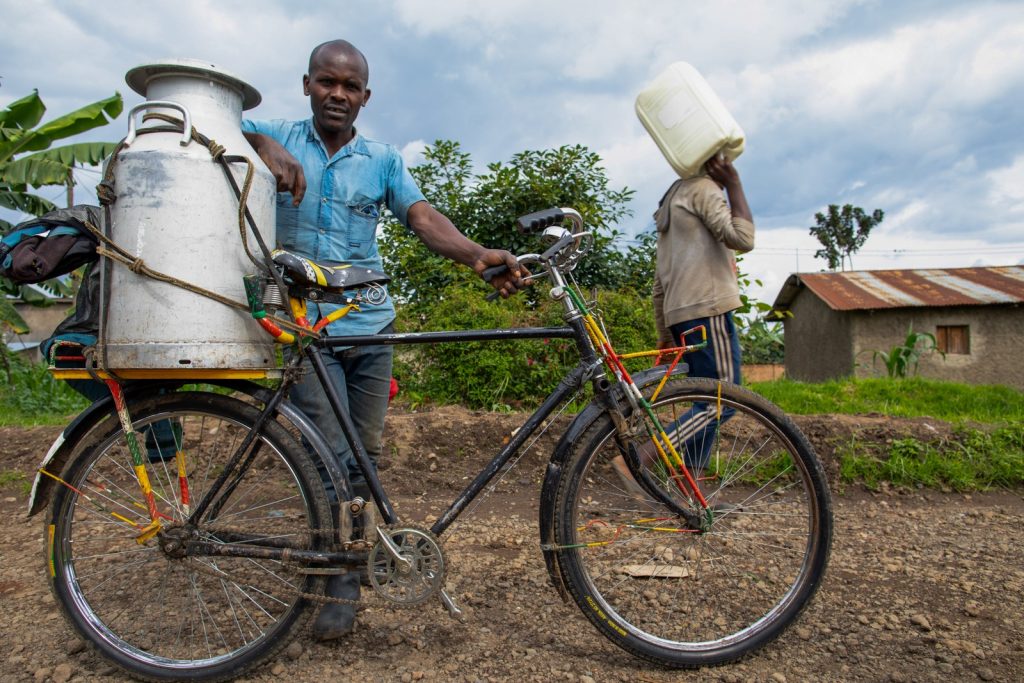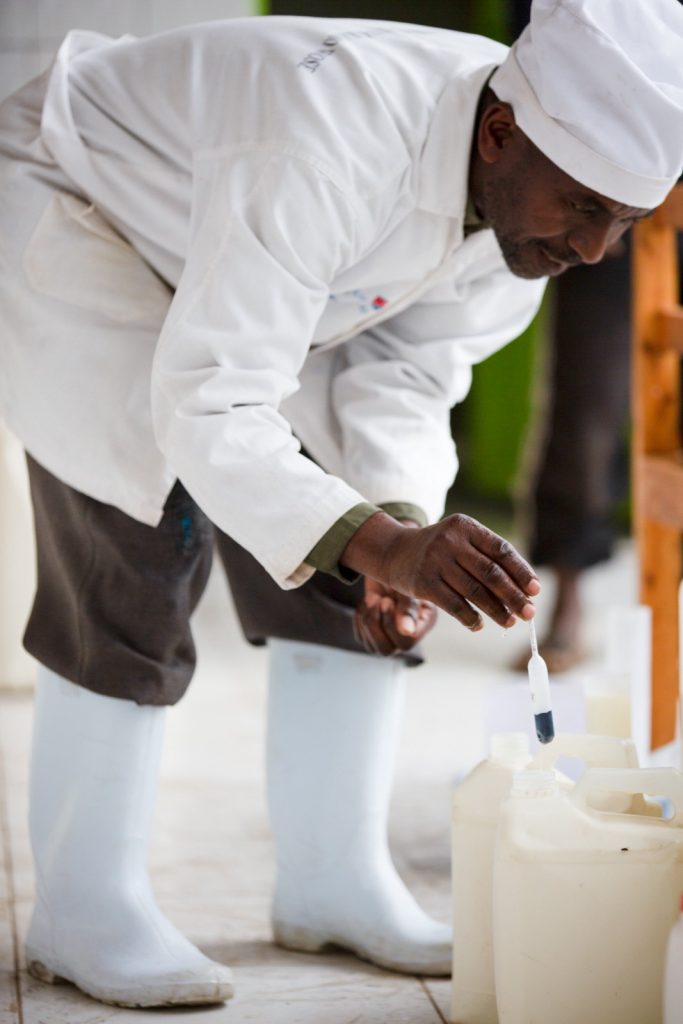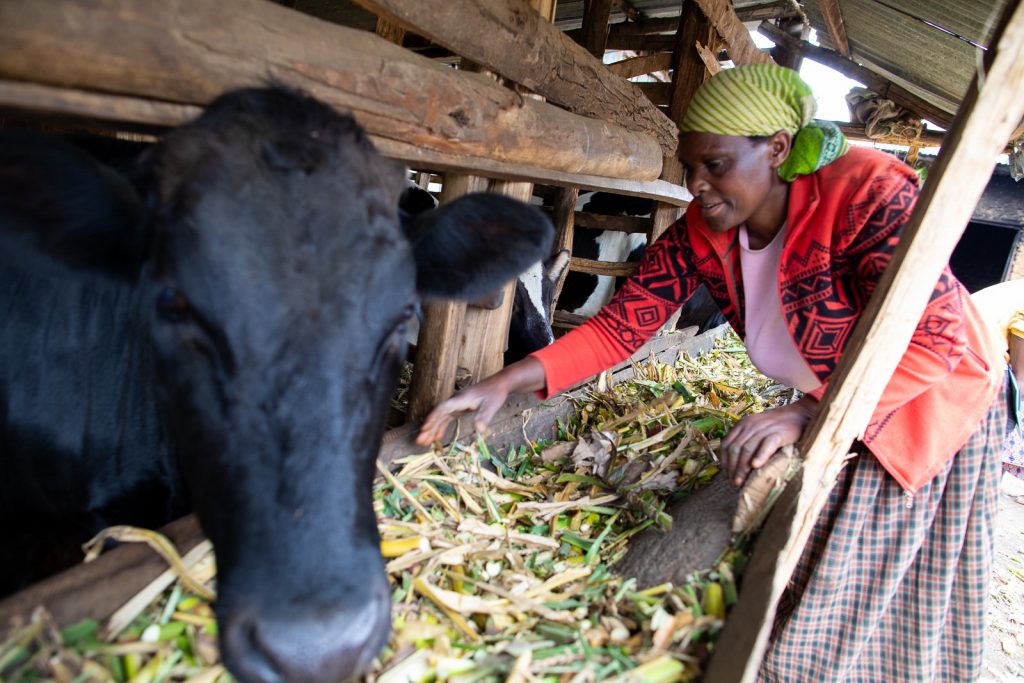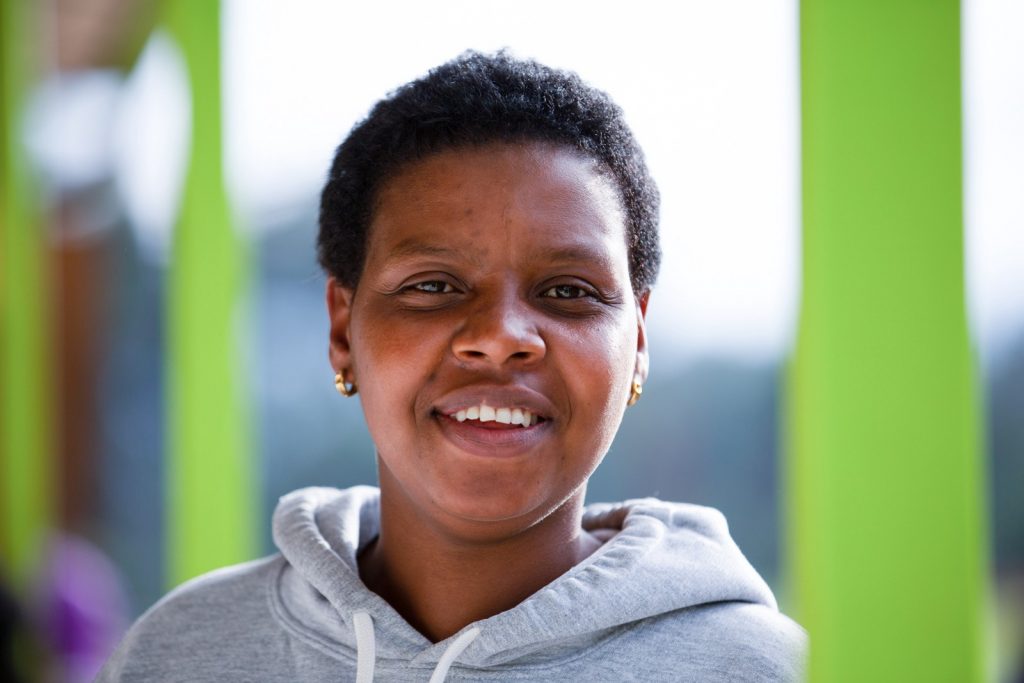A Growing Dairy Business Empowers Women
An entrepreneur works with dairy farmers across Ethiopia to improve access to and quality of milk. From day one of opening her dairy processing company, Hirut Yohannes Darare’s goal was…
Read MoreMoo-ving in the Right Direction: Milk Collection Centers in Rwanda Modernize
By Ellie Van Houtte for RTI International

Imagine riding a bike with 15 gallons of liquids along steep, bumpy and weaving dirt roads for three hours. When you arrive at your destination, you are told that there is no capacity for your product. After a long journey, you return home empty-handed and with no income for the day.
For dairy farmers and milk transporters in the Musanze District of Rwanda, this was a common challenge. And, even if their milk was processed, distributors might reject it as the milk’s quality could not be verified to national safety standards.
“Milk was going to waste,” said Musanze District dairy farmer Mahoho Samuhire, of the regular rejection of his milk by local collection centers because they did not have room to take his product. Without a guaranteed source of income, it was difficult for him to support his family.


But everything changed when USAID’s Private Sector-Driven Agricultural Growth project, which is part of the U.S. Government Feed the Future initiative, worked with the Rwanda Private Sector Federation’s Chamber for Agriculture and Livestock and the Musanze District Agriculture office to convene dairy farmers, private sector businesses, government officials and other stakeholders for a series of public-private dialogues. Together, they identified supply chain challenges and strategies for improving the processes on a local level to help dairy farmers earn more and consistent income.
“In collaboration with the private sector, we have many avenues to increase economic opportunities for farmers,” said Jean Ngendahayo, Director of Agriculture, Environment and Natural Resources for the Musanze District of Rwanda of the resulting impact of project-initiated dialogues.
Modernization of three milk collection centers in the district was the first step toward creating a pipeline of milk products to meet distributor demand. Farmer advocacy, technical training and financing information also connected stakeholders together to access resources for improving system efficiency and economic opportunity.

Up to 95 farmers arrive at the Kingi Milk Collection Center every afternoon with metal canisters filled with milk that has been freshly collected from local dairy cows. A milk inspector has been trained to meticulously test each delivery for density and freshness before it is accepted for purchase.
Until recently, the collection center had only enough capacity for 500 liters. With a new cooling machine, they can collect up to 2,000 liters of milk daily.
“Many families in the area are now capable of building homes [thanks to the additional profit they are able to make],” said Samuhire, describing the positive impact of the changes at the Kingi Milk Collection Center. “If the price increases and demand expands, we will have even greater income.”
In addition to new lab equipment to test milk quality, as well as higher-quality containers for transport, the collection center has been able to get distributors to buy more of their milk, offering a steady market pipeline and more guaranteed income for dairy farmers.
 Pierre J. Nizeyimana, a milk collector at the Kingi Milk Collection Center in the Musanze District of Rwanda, pours milk from member farmers into a 2,000 liter cooling machine. With the support of PSDAG, farmers participated in dialogues with the local government and private sector stakeholders that resulted in financial support to fund the purchase of this equipment. With their new cooling machine, the center can collect more milk and ensure that the product’s quality meets national safety standards. Credit: Ellie Van Houtte for RTI International.
Pierre J. Nizeyimana, a milk collector at the Kingi Milk Collection Center in the Musanze District of Rwanda, pours milk from member farmers into a 2,000 liter cooling machine. With the support of PSDAG, farmers participated in dialogues with the local government and private sector stakeholders that resulted in financial support to fund the purchase of this equipment. With their new cooling machine, the center can collect more milk and ensure that the product’s quality meets national safety standards. Credit: Ellie Van Houtte for RTI International.Kingi Milk Collection Manager Francine Mbanjimpund has witnessed a positive transformation of the cooperative. In 2008 the cooperative started with 54 members; today, the cooperative boasts 124 members and offers benefits such as health insurance, business training, discounts on feed and supplies and veterinarian services. While physical improvements have made the cooperative more professional, the benefits of working together in the community create a greater potential for long-term success.

With newfound efficiency and demand, the milk collection center is now reaching peak capacity. To ensure that no milk goes to waste, co-op members are exploring ideas to ensure future revenue for farmers. The co-op is saving for another cooling tank as well as a backup generator, pump and additional milk testing kits.
A grant procured from the Government of Rwanda is allowing the co-op to build a space for butter production; 80% of funds will come from the government if the co-op can contribute 20% towards project costs. Excess milk will be made into butter, a valuable commodity to local households and the many hostels that host visitors looking to see the area’s volcanoes and endangered mountain gorillas.

The transformations spurred by public-private dialogues have evolved beyond the dairy value chain to other agriculture sectors in the Musenze District; in addition to increased crop productivity, each village now has agriculture advisors and the local agriculture extension office has created demonstration plots for showcasing effective growing techniques.
The project will soon come to a close but its impact will continue as it has built capacity in the cooperatives and private sector, as well as in the public sector, to keep momentum strong. “Farmers are already seeing the positive impact…they can buy a TV, pay school fees, or medical insurance, build a house or even buy a plot of land,” said Musanze District Director of Agriculture, Environment and Natural Resources, Jean Ngendahayo. He also said that his office would continue to lead and be involved in private-public dialogues in Musanze District.
Since 2014, USAID’s Private Sector-Driven Agricultural Growth Project in Rwanda, implemented by RTI International as part of Feed the Future, has partnered with more than 50 businesses and 90 cooperatives to mobilize more than $11 million dollars in new private sector capital investment and $26.3 million in loans and credit into the agriculture sector. In addition to building strategic partnerships with the private sector and building the capacity of more than 249,000 farmers and cooperative members, the project has worked with financial institutions and the Government of Rwanda to create enabling environments and policy for private sector growth.
An entrepreneur works with dairy farmers across Ethiopia to improve access to and quality of milk. From day one of opening her dairy processing company, Hirut Yohannes Darare’s goal was…
Read MoreSitembiswe Peme, a small-scale dairy farmer and member of Pemba Dairy Cooperative in southern Zambia, has a small herd of cows that she milks each day. Until recently, cows were…
Read More